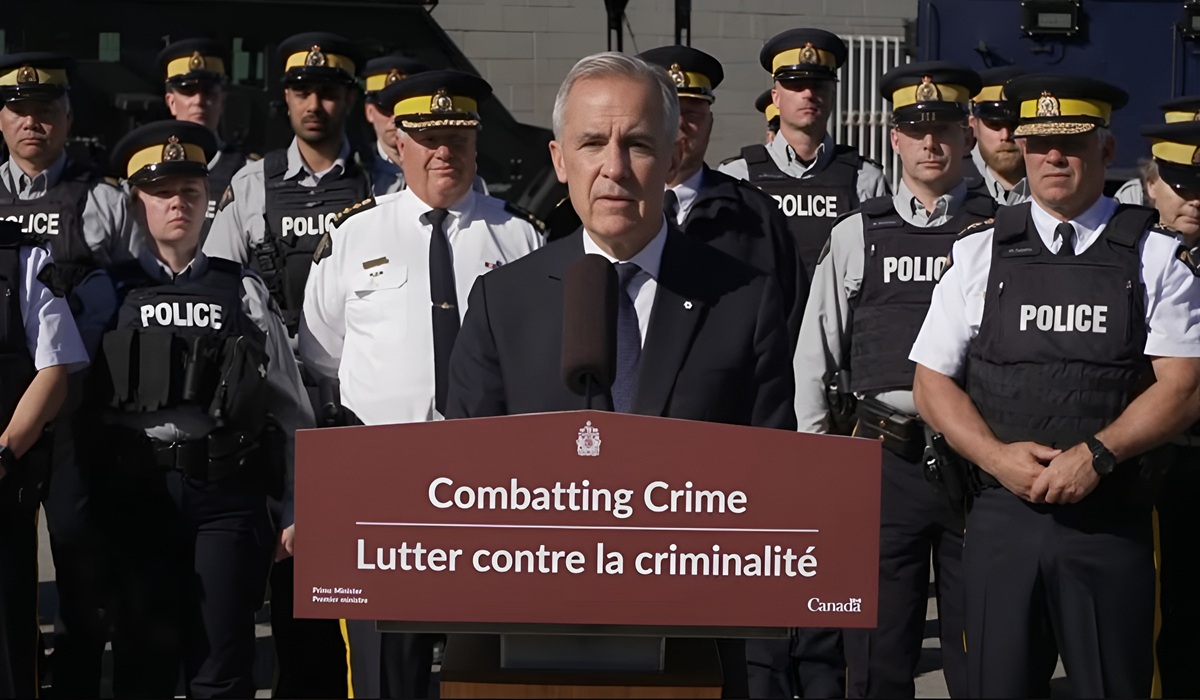Carney’s Crime Crackdown: A Shift Toward Accountability, With Eyes Still on Root Causes
- TDS News
- Canada
- October 16, 2025

By: Donovan Martin Sr, Editor in Chief
Etobicoke, Ontario – October 16, 2025, For years, Canadians have called for tougher laws, stricter bail conditions, and real accountability for repeat offenders. Today, Prime Minister Mark Carney answered that call, unveiling one of the most sweeping public safety initiatives in recent memory — a comprehensive crime package aimed at making communities safer while still acknowledging that enforcement alone won’t solve the deeper social crises driving crime in the first place.
Speaking in Etobicoke, Carney made clear that his government’s approach is about restoring confidence in the justice system. “When laws repeatedly fail to protect those basic rights, we need new laws,” he said, addressing a crowd of local residents and reporters. The Prime Minister described the reforms as a rebalancing — a move to protect citizens first while continuing the difficult work of addressing poverty, addiction, and mental health.
Under the new measures, the government will introduce amendments to the Criminal Code targeting violent and repeat offenders. The proposed legislation, expected next week, includes reverse-onus bail provisions for major crimes such as sexual assault, human trafficking, violent auto theft, and organized retail theft. The changes would also allow for consecutive sentencing — meaning that multiple crimes would add up to longer prison terms — and restrict conditional sentences for sexual offences.
In addition to legislative reform, the Carney government plans to add 1,000 new RCMP officers, with $1.8 billion in funding over four years. These recruits will bolster policing capacity across the country, focusing on emerging threats like online fraud, organized crime, and money laundering. A dedicated task force of 150 officers will target financial crimes, including the recovery of illicit assets, while an increased cadet allowance is expected to attract new recruits to the force.
This announcement is being seen by many as a long-awaited step in the right direction — a return to law and order after years of public frustration with what many Canadians perceived as lenient bail conditions and revolving-door justice. “This is what people have been calling for,” said one Toronto resident outside the event. “You can’t keep releasing violent offenders on bail and expect things to get better.”
Still, even supporters of the tougher stance recognize that crime prevention requires more than enforcement. Carney’s remarks acknowledged this balance, emphasizing that his government is working with provinces and local authorities to address the root causes of criminal behavior — from mental health and addiction to housing instability. “To truly make communities safer, we must make major investments to build affordable housing, support those struggling with mental health and addictions, and reinforce programs for at-risk youth,” he said.
Finance Minister François-Philippe Champagne called the measures “strong action to keep Canadians safe,” noting that Budget 2025 will invest heavily in justice, law enforcement, and prevention. Justice Minister Sean Fraser echoed that sentiment, saying his department is committed to giving police and prosecutors stronger tools to keep violent offenders off the streets. Public Safety Minister Gary Anandasangaree highlighted the national security implications, calling the RCMP expansion “a significant investment in the safety of all Canadians.”
For many, this announcement marks a turning point in how the federal government deals with crime — less talk, more action. But for others, it’s also a reminder that without sustained investments in social programs, housing, and rehabilitation, Canada risks treating symptoms rather than causes. The challenge now is balance: ensuring that Canadians feel safe in their homes and communities while ensuring justice remains fair and humane.
Critics of past federal crime policies have often argued that governments swing too far in one direction — either toward enforcement without compassion or compassion without accountability. Carney’s plan attempts to strike a middle ground, coupling stronger laws with social investment. Whether it succeeds will depend on execution, cooperation with provinces, and whether the justice system can move swiftly enough to restore faith among Canadians who’ve lost confidence in it.
For now, the public mood is one of cautious optimism. Across the country, people are saying the same thing — it’s about time. Tougher laws are welcome, but the root causes of crime can’t be ignored. If the Carney government can deliver both enforcement and prevention, Canada may finally be closer to the safer, more just nation it’s long promised to be.








